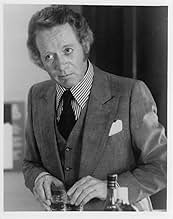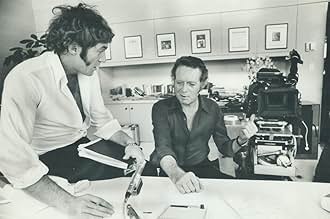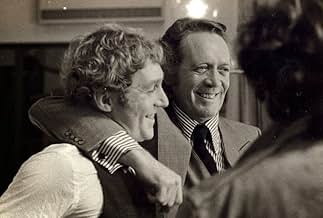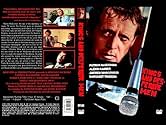A group of terrorists take a radio disk jockey and his wife and child hostage in order to get their manifesto out to the world.A group of terrorists take a radio disk jockey and his wife and child hostage in order to get their manifesto out to the world.A group of terrorists take a radio disk jockey and his wife and child hostage in order to get their manifesto out to the world.
- Awards
- 1 nomination total
Peter MacNeill
- George
- (as Peter McNeil)
Featured reviews
Slow boil. That's how I would describe this Canadian drama/thriller.This is not an action movie as much as it is a battle of wits sort of like Sleuth. I could easily imagine this story being performed on stage with the setting being John Kingsley's studio.
Like any fan of the classic surrealistic torrent of a TV show, The Prisoner. Patrick McGoohan's show ran for 17 episodes. It ended in a sea of controversy because it refused to follow the conventions of storytelling. Alexis Kanner appeared in three different episodes of that show. His characters were wild, unpredictable and boyishly devious. McGoohan thought enough about Kanner to have him return for the series finale which was filmed a year after it's predecessor leading up to it. McGoohan directed Kanner and now in Kings and Desperate Men, Kanner is directing McGoohan.
The film uses audio a lot in the beginning and frankly, it's a little frantic and disorientating not knowing who is speaking. If you listen carefully later, you are able to put faces to the voices. This is an enigmatic beginning to any film.
The story revolves around a British radio talk show host, living in Canada, who himself/his wife, his son and his radio show are all held hostage. Also being held hostage is a judge who sentenced a man to jail for 15 years. His crime was vehicular manslaughter. The, let's call them domestic terrorists, either acting out of friendship fr the convicted man, or revenge on his behalf, or out of some political motive seize the people and the show to hold a 'public trial' of the man who was sentenced to 15 years.
Now, like any movie or theater project led by an actor, the story is fueled heavily by the characters. Much of the story is a battle of wits between the ringleader of the terrorists, Lucas Miller played by Alexis Kanner (in one of his last appearances in front of the camera) and the radio host Kinglsey played by McGoohan.
The movie also features the then wife of the then PM of Canada, Margaret Trudeau. Andrea Marcovicci who, I frankly know her best from The Stuff is memorable as one of the six terrorists. Her character is somewhat of a loose cannon much like Frank Moore's portrayal. He played one of the terrorists also.
If you have an appreciation for these actors already (especially Prisoner fans) you will find this movie to be a treat. If you enjoy a somewhat out of left field psychological thriller then you will find this to be a treat also. There's enough eccentricities and black humor to make the near 2 hours pleasurable and rewarding.
Like any fan of the classic surrealistic torrent of a TV show, The Prisoner. Patrick McGoohan's show ran for 17 episodes. It ended in a sea of controversy because it refused to follow the conventions of storytelling. Alexis Kanner appeared in three different episodes of that show. His characters were wild, unpredictable and boyishly devious. McGoohan thought enough about Kanner to have him return for the series finale which was filmed a year after it's predecessor leading up to it. McGoohan directed Kanner and now in Kings and Desperate Men, Kanner is directing McGoohan.
The film uses audio a lot in the beginning and frankly, it's a little frantic and disorientating not knowing who is speaking. If you listen carefully later, you are able to put faces to the voices. This is an enigmatic beginning to any film.
The story revolves around a British radio talk show host, living in Canada, who himself/his wife, his son and his radio show are all held hostage. Also being held hostage is a judge who sentenced a man to jail for 15 years. His crime was vehicular manslaughter. The, let's call them domestic terrorists, either acting out of friendship fr the convicted man, or revenge on his behalf, or out of some political motive seize the people and the show to hold a 'public trial' of the man who was sentenced to 15 years.
Now, like any movie or theater project led by an actor, the story is fueled heavily by the characters. Much of the story is a battle of wits between the ringleader of the terrorists, Lucas Miller played by Alexis Kanner (in one of his last appearances in front of the camera) and the radio host Kinglsey played by McGoohan.
The movie also features the then wife of the then PM of Canada, Margaret Trudeau. Andrea Marcovicci who, I frankly know her best from The Stuff is memorable as one of the six terrorists. Her character is somewhat of a loose cannon much like Frank Moore's portrayal. He played one of the terrorists also.
If you have an appreciation for these actors already (especially Prisoner fans) you will find this movie to be a treat. If you enjoy a somewhat out of left field psychological thriller then you will find this to be a treat also. There's enough eccentricities and black humor to make the near 2 hours pleasurable and rewarding.
John Kingsley is a former stage actor who hosts a Canadian based radio phone in on various topics in a provocative and sniping style. As Christmas approaches he is tricked into opening up his studio to an armed radical historian and his partner, whose colleagues are holding Kingsley's wife and son as well as a city's mayor, in order to bring attention to an unjustly sentenced hit and run driver.
The aims seem lofty, co-writer, director and star Alexis Kanner attempts commentary on political ambition and naivety, misdirected violence, class and celebrity. However, he hands in a pretentiously edited and shot, self consciously arty and clunky dialogue driven drama with what appears to be an appropriately inebriated performance from Patrick McGoohan as the suave, sozzled, and compromised radio host. Kanner's own dazed turn as the would-be intellectual champion of justice fails to launch, but his finished product has spirit and a daring that could either be admired or jeered at (as many critics did). As seen from previous reviews connoisseurs of McGoohan and Kanner's interactions in The Prisoner will scan this movie for other significances.
The aims seem lofty, co-writer, director and star Alexis Kanner attempts commentary on political ambition and naivety, misdirected violence, class and celebrity. However, he hands in a pretentiously edited and shot, self consciously arty and clunky dialogue driven drama with what appears to be an appropriately inebriated performance from Patrick McGoohan as the suave, sozzled, and compromised radio host. Kanner's own dazed turn as the would-be intellectual champion of justice fails to launch, but his finished product has spirit and a daring that could either be admired or jeered at (as many critics did). As seen from previous reviews connoisseurs of McGoohan and Kanner's interactions in The Prisoner will scan this movie for other significances.
The director or director of photography, or some other "genius" used the tired old trick of letting the camera be the eyes of one of the characters. Unfortunately, this, combined with "disembodied voices" makes watching this film remind one of a really bad alcoholic hangover!
Given the choice between watching this turkey and a real hangover, ...I'm out the door to the nearest liquor store!
Given the choice between watching this turkey and a real hangover, ...I'm out the door to the nearest liquor store!
Overly long and often aimless hostage story with lots of funky camera angles that try to convey confusion -- though one need not look much farther than the plot for that. Good performances by McGoohan & Kanner (who worked together on McGoohan's THE PRISONER), but overall, the poor plot drags it down.
Womanizing, boozing talk radio show host John Kingsley (Patrick McGoohan) has a large and rapidly expanding audience for his program on Montreal-based station JXYL. His condescending, bloody-minded persona irritates but also captivates listeners. Depending on the issue or the guest or the caller and each respective listener's views Kingsley can become the hero or the villain during his discussions which can often be dismissed as rants. He routinely humiliates callers and guests in debates. He can put them on air and cut them off as he pleases.
In his forum he is a towering presence and authority figure. It gives him the status of celebrity in public which he has used to marry into money and curry favor with the local elite. A Britisher, he never quite found his niche until he emigrated to Canada. The very unremarkable way this seemingly remarkable man conducts himself personally is galling for many. The most coherently Canadian aspect of the narrative is how alienated everyday Montrealers felt from the wealthy and powerful dwelling in the high-end Westmount area of the city.
At the end of his Christmas eve show during which his friend Judge McManus (Budd Knapp) appeared as guest, the two of them then attend the JXYL gala Christmas party. Suddenly a series of benign-seeming events serve to situate different people in the grasp of those with malevolent intent. Lured in a drunken state back to the studio where he broadcasts his show by a seductive woman (Andrea Marcovicci), he finds a shotgun pointed at him and it is made clear that her terrorist associates also have abducted Judge McManus and are holding Kingley's Westmount socialite wife (Margaret Trudeau) and child (Jean-Pierre Brown) in a separate location where they have a bomb. They demand air-time on his next show.
Kingsley is, at first, understandably quite blindsided by the group of people who forcibly disrupt his life and that of those he loves. But his reaction to the situation at various times during the hours that follow verges on the bizarre. He can't help but prod his captors in the time leading up to the show and very much during it. Pushing people's buttons is what he does and he is extremely effective at it whether the situation calls for it or not. That dialectic which should be explosive lingers a little too gently through the night at the studio until the show begins the next morning.
Lucas Miller (Alexis Kanner), a university lecturer who somehow (Never adequately explained and far from evident) decided to become the leader of a terrorist group has a bone to pick with the justice system and a court case that he wants to use Kingsley's show to retry. Once the broadcast begins it becomes less than clear at times whether Miller is using Kingsley as effectively as Kingsley is using him.
It becomes even less clear why people (At least six of them from what we see and hear) would follow Miller in terrorist acts so highly illegal that their lives as they knew them would certainly be over at the conclusion. The more we know about the court case the terrorists say they are so motivated by, the less it seems like anything.
The on-screen chemistry between longtime friends McGoohan and Kanner used to such great effect on episodes of The Prisoner (1967-68) is scarcely evident in their scenes together in this production. Whilst Kanner adapted the screenplay he never got a handle on portraying terrorist ring-leader Miller. Most of his performance appears to convey disconcerted bewilderment at how things unfold and in a way which deflates much of the tension needed for it to be effective. It might have been better if it had been a stage play particularly since Kanner's performance is one which looks more like it belongs on a stage.
As a film it doesn't quite work even though there are some entertaining moments. Director/producer/cinematographer Alexis Kanner (Purportedly on large doses of pills and Scotch during filming) took on far too much himself. The eccentric or perhaps even self-indulgent manner in which this film was shot and cut (Kanner was in the editing room with it in post-production for a couple of years - Shot in 1977, it wasn't released until 1981) goes along with the eccentric or perhaps even self-indulgent manner in which it was written and acted.
McGoohan is effective throughout as is Marcovicci as are veteran Canadian actors August Schellenberg and Frank Moore. Margaret Trudeau, the wife of Pierre Elliott Trudeau - then Prime Minister of Canada, somehow found herself cast in this much to the dismay of McGoohan who loathed her and her attempts at a performance (which most would agree came up lacking). This was around the time Mrs. Trudeau was hanging out with the Rolling Stones, prowling Studio 54 and doing various other things to embarrass the much older man she had married who was still trying to run the country.
Perhaps more puzzling casting is Robin Spry portraying a terrorist bomber. Spry is known for doing almost everything BUT acting in Canada's film industry.
Whilst it bears superficial similarities to the 1988 film Talk Radio for some bizarre reason Kanner felt that the 1988 film Die Hard was far more similar to the point where he unsuccessfully sought legal damages for copyright infringement. Of course neither Die Hard nor Talk Radio are taken from Kings and Desperate Men in any obvious, and certainly not any actionable way.
It remains one of the scant few contributions Alexis Kanner was able to make to Canada's domestic film industry. His gifts were not writing or directing or cinematography. He couldn't be happy just being an actor who triumphed in character roles and as anti-heroes in counterculture productions. There was so much more he could have done if he had made better choices.
In his forum he is a towering presence and authority figure. It gives him the status of celebrity in public which he has used to marry into money and curry favor with the local elite. A Britisher, he never quite found his niche until he emigrated to Canada. The very unremarkable way this seemingly remarkable man conducts himself personally is galling for many. The most coherently Canadian aspect of the narrative is how alienated everyday Montrealers felt from the wealthy and powerful dwelling in the high-end Westmount area of the city.
At the end of his Christmas eve show during which his friend Judge McManus (Budd Knapp) appeared as guest, the two of them then attend the JXYL gala Christmas party. Suddenly a series of benign-seeming events serve to situate different people in the grasp of those with malevolent intent. Lured in a drunken state back to the studio where he broadcasts his show by a seductive woman (Andrea Marcovicci), he finds a shotgun pointed at him and it is made clear that her terrorist associates also have abducted Judge McManus and are holding Kingley's Westmount socialite wife (Margaret Trudeau) and child (Jean-Pierre Brown) in a separate location where they have a bomb. They demand air-time on his next show.
Kingsley is, at first, understandably quite blindsided by the group of people who forcibly disrupt his life and that of those he loves. But his reaction to the situation at various times during the hours that follow verges on the bizarre. He can't help but prod his captors in the time leading up to the show and very much during it. Pushing people's buttons is what he does and he is extremely effective at it whether the situation calls for it or not. That dialectic which should be explosive lingers a little too gently through the night at the studio until the show begins the next morning.
Lucas Miller (Alexis Kanner), a university lecturer who somehow (Never adequately explained and far from evident) decided to become the leader of a terrorist group has a bone to pick with the justice system and a court case that he wants to use Kingsley's show to retry. Once the broadcast begins it becomes less than clear at times whether Miller is using Kingsley as effectively as Kingsley is using him.
It becomes even less clear why people (At least six of them from what we see and hear) would follow Miller in terrorist acts so highly illegal that their lives as they knew them would certainly be over at the conclusion. The more we know about the court case the terrorists say they are so motivated by, the less it seems like anything.
The on-screen chemistry between longtime friends McGoohan and Kanner used to such great effect on episodes of The Prisoner (1967-68) is scarcely evident in their scenes together in this production. Whilst Kanner adapted the screenplay he never got a handle on portraying terrorist ring-leader Miller. Most of his performance appears to convey disconcerted bewilderment at how things unfold and in a way which deflates much of the tension needed for it to be effective. It might have been better if it had been a stage play particularly since Kanner's performance is one which looks more like it belongs on a stage.
As a film it doesn't quite work even though there are some entertaining moments. Director/producer/cinematographer Alexis Kanner (Purportedly on large doses of pills and Scotch during filming) took on far too much himself. The eccentric or perhaps even self-indulgent manner in which this film was shot and cut (Kanner was in the editing room with it in post-production for a couple of years - Shot in 1977, it wasn't released until 1981) goes along with the eccentric or perhaps even self-indulgent manner in which it was written and acted.
McGoohan is effective throughout as is Marcovicci as are veteran Canadian actors August Schellenberg and Frank Moore. Margaret Trudeau, the wife of Pierre Elliott Trudeau - then Prime Minister of Canada, somehow found herself cast in this much to the dismay of McGoohan who loathed her and her attempts at a performance (which most would agree came up lacking). This was around the time Mrs. Trudeau was hanging out with the Rolling Stones, prowling Studio 54 and doing various other things to embarrass the much older man she had married who was still trying to run the country.
Perhaps more puzzling casting is Robin Spry portraying a terrorist bomber. Spry is known for doing almost everything BUT acting in Canada's film industry.
Whilst it bears superficial similarities to the 1988 film Talk Radio for some bizarre reason Kanner felt that the 1988 film Die Hard was far more similar to the point where he unsuccessfully sought legal damages for copyright infringement. Of course neither Die Hard nor Talk Radio are taken from Kings and Desperate Men in any obvious, and certainly not any actionable way.
It remains one of the scant few contributions Alexis Kanner was able to make to Canada's domestic film industry. His gifts were not writing or directing or cinematography. He couldn't be happy just being an actor who triumphed in character roles and as anti-heroes in counterculture productions. There was so much more he could have done if he had made better choices.
Did you know
- TriviaThis film was the brainchild of Alexis Kanner. He and Patrick McGoohan met via Kanner's performance in an episode of McGoohan's popular British television show Le prisonnier (1967). Kanner worked on the idea and polished it for a few years before finally calling up McGoohan to ask him to star in the film.
- GoofsThe reflection of two crew members are briefly seen just before Margaret Trudeau enters an elevator towards the beginning of the film.
- Quotes
Lucas Miller: When you sign off at the end of your show, you always say, "This is your program"... well I am taking you up on that, Mr. Kingsley.
- Crazy creditsKineversal Productions Presents a Film of a Hostage Incident
- ConnectionsFeatured in In Search of the Prisoner (2001)
Details
- Release date
- Country of origin
- Language
- Also known as
- Kings and Desperate Men: A Hostage Incident
- Filming locations
- Production company
- See more company credits at IMDbPro
Box office
- Budget
- CA$1,200,000 (estimated)
- Runtime1 hour 58 minutes
- Color
- Aspect ratio
- 1.85 : 1
Contribute to this page
Suggest an edit or add missing content

Top Gap
By what name was Kings and Desperate Men (1981) officially released in Canada in English?
Answer
























